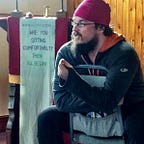Someone to Catch you When you Fall: Mental Ill-Health and Academia
The only thing I ever wanted to be was an academic. Ideally one of those, as I thought, magical beings — a public intellectual. As a child in the 1970s and 1980s, my mind at its most malleable was shaped by Feynman, Sagan, Greer, and the grandest panjandrum of them all, Doctor Jonathan Miller.
Later, as an impressionable Masters student I found myself at Martha Nussbaum’s visiting lecture series in Oxford “Ascents of Love”. She pulled information from every conceivable source, bombarding every sense, corralling everything into a single tightly-woven thread of insight. It was the moment I knew I wanted to do what she did.
Fast forward to 2000, and that dream was beginning to take shape. I had a first in Theology and Philosophy, a distinction in my Masters, and some convoluted but promising work on Puritan erotic discourse, feminist psychoanalysis and the place of subjectivity in the great taxonomical debates of the 17th century. That summer I had won the World Intelligence Championship. I was well on my way. I was within touching distance of my dream of becoming a pale imitation of Alain de Botton.
Of course, it hadn’t been a smooth ride, but didn’t that go with the territory? There had been the 6 months as a 15 year old I hadn’t talked to anyone. Literally. At all. And the Michaelmas Term of my 2ndyear when I acquired 23 translations of the Bible, practised bridge till 4 each morning before being up for 9 o’clock lectures, and drank so much alcohol that on the night that led to me getting expelled from the Great Britain Juniors Bridge Team for bringing the game into disrepute, half the amount I consumed would have been a fatal dose for almost any normal person. But that was normal, wasn’t it? Academics are meant to be a bit eccentric. And besides, people kept on telling me what they’d told me all my life. “You’re clever. You’ll be fine. Just work hard.”
So I can’t have had a problem. Can I? The day after day after day when I physically couldn’t move from the corner of the room where I’d rock with my hands over my ears and my eyes shut because that was the only way to keep the world out. That can’t have been a problem. Because I didn’t have problems. It felt like a problem when I looked at the pile of letters I hadn’t opened for 6 months because the thought of what might be in them and the absolute, final end it might bring to my world made me physically ill. But people who knew told me the same thing: I was clever, I’ll be fine. So when the chapters didn’t get written that can only have been laziness. And I was told again and again that any gaps in the CV would put an end to my hopes. So I clearly just needed to work harder. And when my body and my mind screamed they couldn’t I just needed to thrash them, often literally, until they would.
Of course, I wasn’t fine. I had bipolar disorder. A decade and a half of trying to make my willpower the unstoppable force to batter through the immovable object of my illness had left me with thousands of pounds of debt and utterly burned out. And that was the end of that. It was another 5 years before I had the strength to get a low level admin job.
If you are struggling the way I did, then you are not fine. Do not let people tell you you are fine. Do not let people say that because you are clever you will be OK. Invisible conditions are awful because people will not believe you. When you are also incredibly bright, you can multiply that up exponentially, because you will, almost all the time, look absolutely fine. You will be achieving things many couldn’t imagine achieving if they had every battery running on 11. So many people will not believe you have problems. But you do. And there are people here who know that and will listen. Things may, or may not, turn out OK, but if you don’t seek help because you believe the fault somehow lies with you, with your motivation or your effort, you will be a lot less OK than if you do.
When you are bright, you are led to believe you can work your way through anything. You can work your way through the most complex problems academia can throw at you. But you can’t work your way out of mental ill health. Take the time you need to get the support you need. Because a month, or a year, or even a few years, won’t necessarily put an end to your dreams. But leaving it too late will.
